California
Sen. Padilla & American Diabetes Association on effort to lower insulin cost
“For far too long, Americans with diabetes have been exploited at the hands of pharmaceutical companies who profit off of their illness”
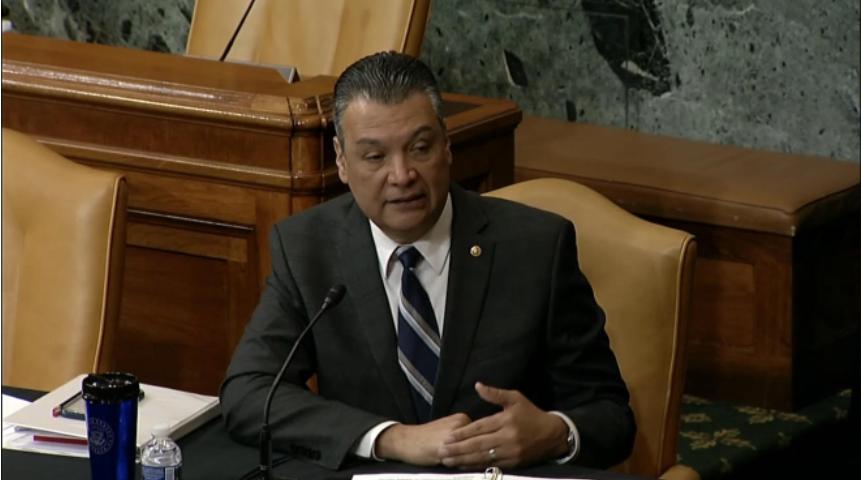
LOS ANGELES – U.S. Senator Alex Padilla (D-Calif.) joined the American Diabetes Association for a virtual discussion Thursday on efforts to lower the cost of insulin for the more than 3.2 million Californians diagnosed with diabetes.
During the conversation, Padilla advocated for the Affordable Insulin Now Act, which would require Medicare plans and private group or individual plans to cap patients’ out-of-pocket costs for insulin at $35 per month.
“No one should have to choose between putting food on the table or being able to afford life-saving medication,” said Senator Padilla. “For far too long, Americans diagnosed with diabetes have been exploited at the hands of pharmaceutical manufacturers who profit off of their illness. I am committed to making health care more affordable and lowering prescription drug costs, including lowering the cost of insulin for millions of Californians.”
“The risk to people with diabetes when they cannot afford to take the required amount of insulin to manage their diabetes is immense,” said Dr. Francine R. Kaufman Chief Medical Officer of Senseonics, Inc. “This means insulin must be within reach economically for all who need it to survive and thrive.”
“We hear about local Silicon Valley residents making the gut-wrenching choice between buying insulin, paying rent, or putting food on the table,” said Michele Lew, CEO of The Health Trust, a nonprofit in San Jose, CA. “We can – we must – fix this problem.”
“People living with diabetes who rely on insulin to live and thrive need Congress to act now to reduce insulin costs. This is especially true for the one in four insulin-dependent people forced to ration insulin doses as a result of the high cost to patients,” said Francisco Prieto, MD, Chair of the American Diabetes Association (ADA) National Advocacy Committee. “It’s time to bring economic relief to millions of Americans forced to stretch beyond their means every month to pay for their insulin. The ADA encourages the U.S. Senate to follow suit and approve legislation that includes the $35 national insulin co-pay cap.”

Every year an estimated 272,814 people in California are diagnosed with diabetes. Californians with diagnosed diabetes spend an estimated $39.5 billion each year in insulin costs alone.
A downloadable recording of the virtual conference can be found here.
California
Williams Institute reports impact of deportations on LGBTQ immigrants
Latest report suggests transgender, nonbinary and intersex immigrants face significantly higher safety risks
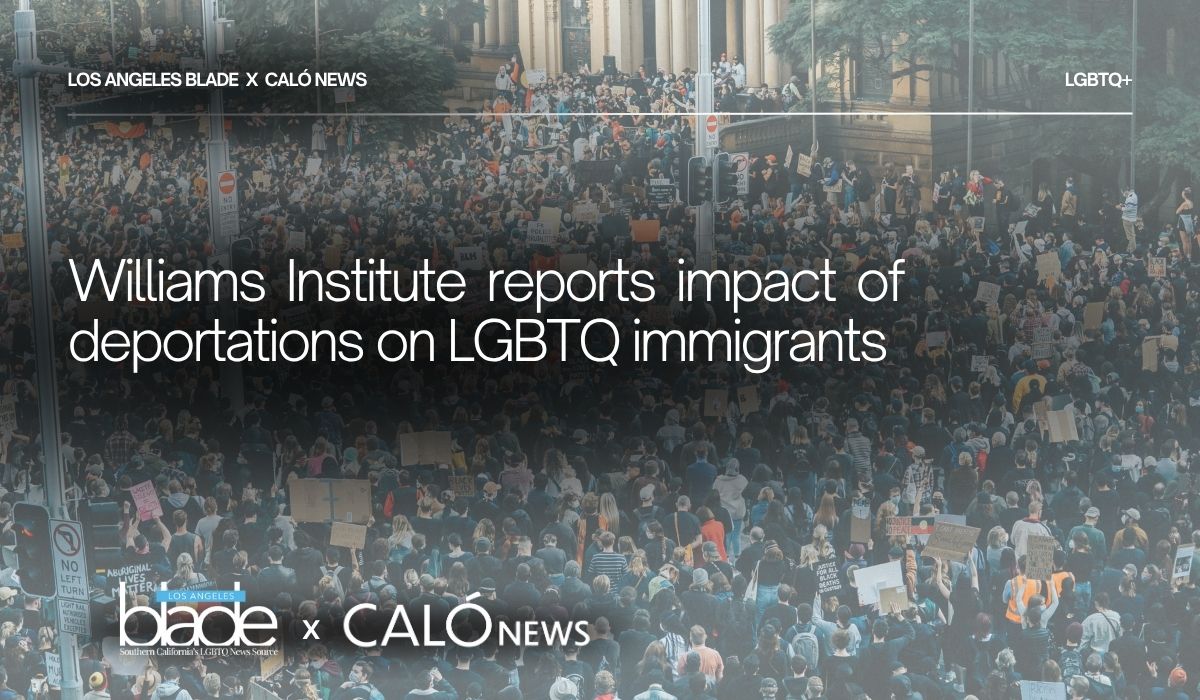
Williams Institute at UCLA has released its latest report, highlighting the intersection between LGBTQ and immigration issues and the impact of the U.S. Customs and Immigration Enforcement (ICE) raids across Los Angeles on LGBTQ people.
According to the brief, LGBTQ immigrants who hold legal status, but who are not naturalized citizens may also face challenges to their legal right to reside in the U.S.
Recent reports indicate that non-citizens with legal status are being swept up in immigration operations and several forms of legal status which were granted at the end of the Biden administration are being revoked. Those include: Temporary Protected Status (TPS) for some Venezuelan immigrants, as well as those from Afghanistan and Cameroon, while Haitian nationals are now facing shortened protection periods, by up to six months.
The Justice Department has proposed a new rule which grants the government border authority to revoke green card holders’ permanent residency status at any time. This rule is currently under review by the Third Circuit Court of Appeals, which could significantly affect non-citizens who are currently documented to reside in the county legally.
Supervisorial District 1, under Supervisor Hilda L. Solis, and Supervisorial District 2, under Supervisor Holly J. Mitchell would particularly be affected as it contains the city center of Los Angeles and nearly 29,000 LGBTQ, noncitizens would face the harshest impact. Those two districts contain many of the county’s historically Black, Latin American and Asian, Pacific Islander neighborhoods.
For transgender, nonbinary and intersex immigrants arrested or detained by ICE, there are additional impacts regarding how federal law defines biological sex and gender identity. The Trump administration has signed an executive order which redefines “sex” under federal law to exclude TGI individuals. This adds an extra thick layer of possible violence when TGI individuals are placed in detention centers or in holding that does not correspond to their identity.
According to the report, ‘transgender, non-binary, and intersex immigrants must navigate an
immigration and asylum system without information about how federal agents will respond to their gender identity and with the risk of greater violence if placed in detention centers, given the effects of this executive order.’
The brief estimates the number or foreign-born adults in Los Angeles County who will be potentially affected by the Trump administration’s executive orders on mass deportations.
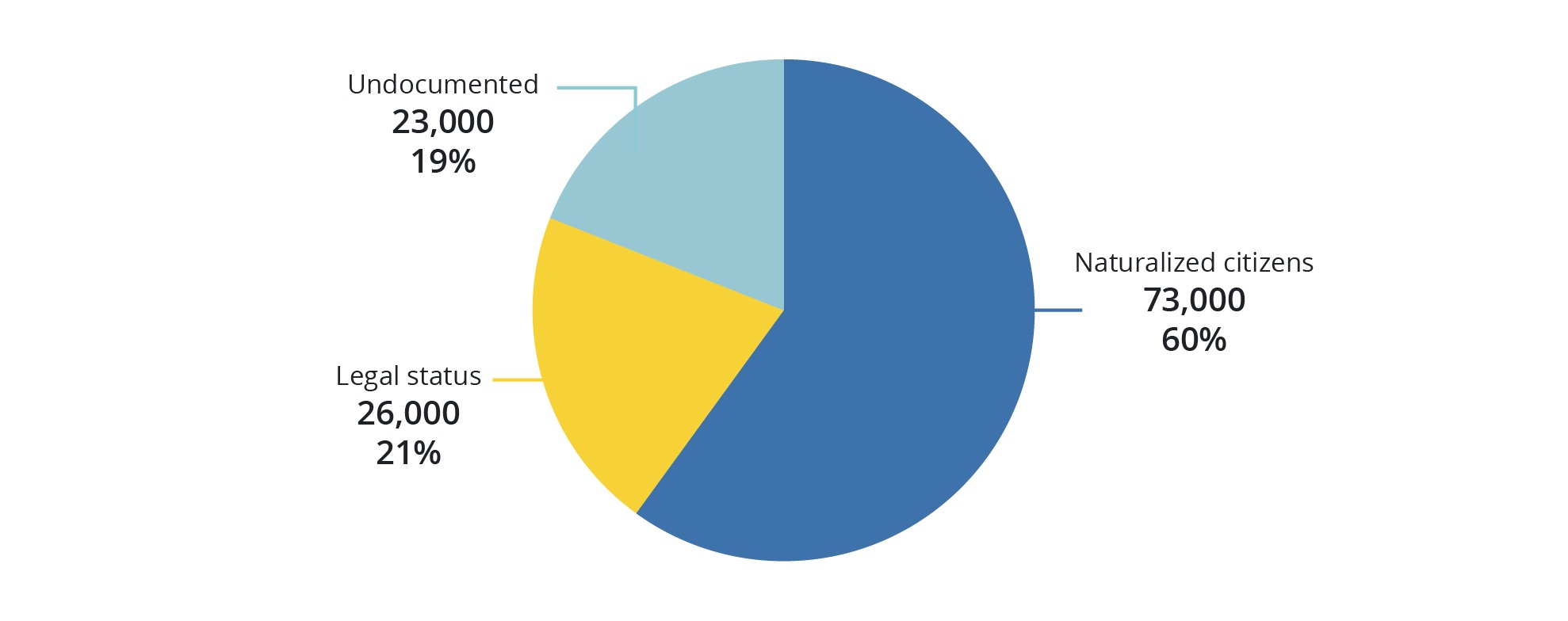
Graphic courtesy of Williams Institute at UCLA.
Using previous data from other Williams Institute Studies and reports from the University of Southern California Dornsife Equity Research Institute and data from the Pew Research Center, the latest brief states that there are over 1.35 million LGBTQ-identifying people across the U.S., with 30% of them residing in California.
The report further points to 122,000 LGBTQ immigrants who reside within LA County specifically, making Los Angeles County home to about 10% of all LGBTQ adult immigrants in the U.S.
While 18% of those Angelenos are foreign-born, only around 7%, or 49,000 of them do not hold legal status.
Using research from the Pew Center and applying an estimate, that means that there are approximately 23,000 undocumented LGBTQ across LA County and the remaining 26,000 LGBTQ immigrants in the county have some form of legal status.
Among the LGBTQ population of adult immigrants in California, approximately 41,000 are transgender or nonbinary. That figure also points toward approximately 5,200 of them residing in LA County. According to the proportions applied for this estimate, the Williams Institute approximates that around 3,100 transgender and nonbinary immigrants in LA County are naturalized citizens, over 1,100 have legal status and just under 1,000 are undocumented.
According to a brief released in February by the Williams Institute, ‘mass deportations could impact 288,000 LGBTQ undocumented immigrants across the U.S.
California
Trinity Park, a foundation of memories from childhood to present day
‘The park, in a sense, saw me grow up and helped me build a close sense of community at a time when I felt very alone and isolated’
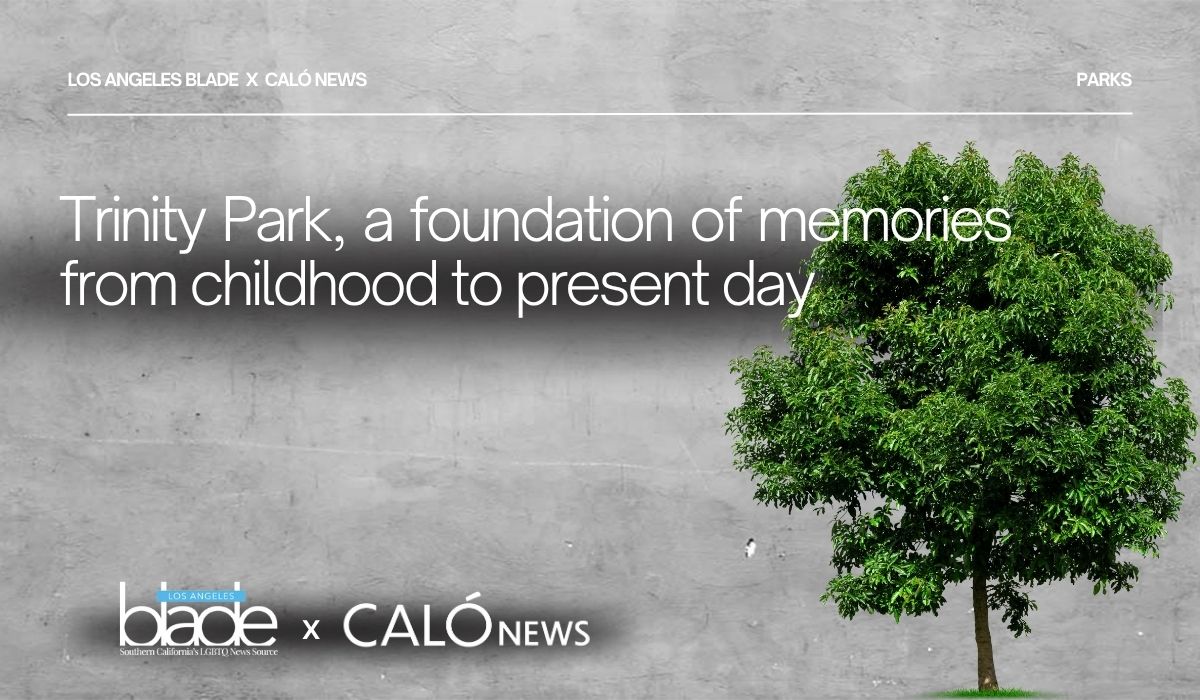
In the heart of South Central Los Angeles lies Trinity Recreation Center, known as Trinity Park, considered what some might refer to as a “hood staple.”
Although there is no denying the park’s history of gang-related incidents and even death, for many, the park is also a place full of profound memories, cherished as one of the only green spaces and gathering places within a community that is often underserved. The park sits in the city’s 9th Council District (CD-9), a district known for its lack of green spaces.
South Central L.A. is often characterized by an over concentration of liquor stores and a lack of quality, affordable grocery stores and sit-down restaurants, contributing to high rates of heart disease, diabetes and premature death among South L.A. residents.
For me, the park brings me back to a time when life was easier. It was the place where I made my first friend. This park was my large family’s front yard for over three years and a place that I have passed by and walked through for over two decades.
Trinity Park was one of the first places I have memories of. A year after my family immigrated to the U.S., we moved into a three-bedroom house across the street from the park. The first year in the states was difficult for my mother, who juggled two jobs.
For me, understanding very little English and not being able to speak it made it extremely difficult to communicate or connect with other kids and adults at school. My thick accent was always a point of concern and embarrassment.
Trinity Park, which in the early 2000s was even more notorious for crime and shootings, was a special place for my family and me during the almost three years that we lived neighboring it.
When my mother worked long hours, my aunts and uncles would take me to the park at least twice a week, where I would run uncontrollably and ride the swings for as long as possible. The park, in a sense, saw me grow up and helped me build a close sense of community at a time when I felt very alone and isolated.
That, too, is what the park has been to many of the kids and community living in the park’s surroundings. Trinity Park, is also located 12 minutes from downtown L.A., in an area of South Central L.A. known as Historic South Central within CD-9, where the majority of the population is composed of Black and Latino working-class families.
The Trinity Recreation Center opened its doors in 1968. In the last few years, there have been significant upgrades and additions to the park, including the 2016 opening of a synthetic soccer field and a skate park, which officially opened in 2021.
To what to many outsiders might look like an unsafe and unpredictable piece of land, Trinity Park holds dear memories for many of those who have passed through or hung out in the park at some point in their lives.
The park was also where I remember making my first true friend in L.A., a friendship that wasn’t sparked because we went to the same class or because our parents knew each other, but because of a simple connection between kids while playing. I don’t remember her name, but the photo below was taken the day I met her at Trinity Park.
My mother, on one of her only days off, had taken me to the park. It was the summer of 2004 and we arrived at the park close to sunset. I wish I could recall more than us playing tag and running around the park, but I remember the feeling of making my first friend, one I had made on my own. We probably spent three to four hours together that day playing and at the end of it all, my mother ran across the street to bring her camera. I think she, too, wanted to preserve the memory, the feeling of seeing her daughter connect with another kid after what had been a very tough time in both of our lives.

Brenda’s friend she made in Trini Park (L) and Brenda (R) pose together at Trinity Park in 2004.
(Photo courtesy of Brenda Fernanda Verano)
That was also the park where I taught myself to ride a bike and that gave me confidence, something that was hard for me to find as a kid.
Later in life, although we moved out of the home across the street from the park, my family and I continued living in that same neighborhood and all throughout my high school journey, I walked through that park every day to get to school. In middle school, the park was also a meetup place for my friends and me after school, where we would hang out and share music playlists.
The park has been a silent but consistent entity from childhood to now — adulthood — always in the background of pieces and times in my life.
EDITORS NOTE: This article was published through the Bezos Fellowship grant provided by the Ethnic Media Services, which recently changed its name to American Community Media. The article was written by Brenda Fernanda Verano, an award-winning journalist and reporter for CALÓ News, a local non-profit newsroom focusing on the Latin American community of Los Angeles.
Breaking News
ICE raids cause civil unrest in Los Angeles during Pride month
Thousands of National Guard members and Marines are now being deployed to Los Angeles with intention to occupy for the next 60 days

ICE raids have taken place across Los Angeles County over the last few days and tens of thousands of Angelenos have taken to the streets to protest against the raids and the police brutality involved in the arrests.
The Trump administration has threatened to arrest Governor Gavin Newsom and L.A. Mayor Karen Bass if they were to interfere with the ICE raids. In response, California has now filed a lawsuit against the Trump administration.
Early Monday morning, the U.S. Northern Command announced that it activated around 700 Marines, after the Pentagon and the Trump administration deployed around 2,000 National Guard troops to Los Angeles over the weekend. As of today, Trump has deployed double the amount of National Guard troops and ICE raids are said to continue for the next 30 days. The deployment is set to cost $134 million and last 60 days or more according to Secretary Pete Hegseth and a senior defense official.
Reporters have been hit with rubber bullets, batons and have been tear gassed while trying to document the protests. There are eyewitness reports and video footage showing police officers trampling people over with horses, running people over with squad cars and detaining people who have legal status.
In a broadcast interview with CNN, Mayor Bass stated that she believes that if ICE raids hadn’t happened on Friday, we would not be seeing the type of disorder we are seeing. The Los Angeles Police Department declared Downtown L.A. an unlawful assembly area after union president David Huerta was detained by ICE along with several undocumented immigrants. Huerta appeared in court on Monday and was released on a $50,000 bond.
LAPD Chief Jim Donnell says they have adapted their tactics to arrest people, but that they are ultimately “overwhelmed” by the number of protesters.
“We have adapted our tactics to take these people into custody and to be able to hold them accountable,” said Chief Donnell. “We are overwhelmed as far as the number of people out there engaged in this type of activity,”
Mayor Bass said she was “completely in sync” with what the police chief stated, adding that she believes there is enough video footage to prosecute protestors even if they did not get arrested on scene.
“Some people might think that just because they haven’t gotten arrested on the spot, that they’ve gotten away with it and the message I would send is: there’s ton of video tape and people who didn’t get arrested today for committing violent acts — don’t plan on the fact that you get off because you can get arrested in the next few days,” said Mayor Bass.
Mayor Bass doubled-down on her statement regarding the ICE raids and how L.A. is a city of immigrants and ICE raids will continue to affect the local economy.
There have also been reports that ICE raids are taking place across schools and graduation ceremonies.
Los Angeles Unified School District is set to deploy school police to set up safe zones around graduations and school campuses amid these raids targeting celebrations. According to the LA Times, school police will patrol and guard campus entrances when ICE and Border Patrol are seen in the area. Graduation ceremonies will become sanctuaries for families until immigration agents disperse from the area.
Medical providers like St. John’s Community Health released a statement on the issue.
“The aggressive increase in ICE activity is forcing already vulnerable people to fear going to the doctor, school, or even the grocery store — and putting countless families in danger,” said Jim Mangia, president and CEO of St. John’s Community Health.
Community leaders like Tony Hoang, executive director at Equality California stated that as a child of immigrants, it deeply saddens him to see the ICE raids take place across Los Angeles.
“Equality California joins Governor Newsom and Attorney General Bonta in calling for an end to National Guard deployment. We condemn the raids that have occurred and are continuing, which are xenophobic and traumatizing to families, individuals, and communities,” he said.
“We stand in solidarity with immigrant communities across Los Angeles and the state—and we call on every leader, at every level of government, to reject this assault on our values and take urgent action to protect those under threat.”
California
New California trans athlete policy creating ‘co-winners’ is a crock
You didn’t misread that. Hernandez shared the podium with ‘co-winners’

A lot happened at last weekend’s high school state track and field championship meet in
Clovis, Calif. Parents of cisgender student-athletes booed the one and only transgender
girl competing. Police and security officers showed up in large numbers to keep
protestors apart and safeguard the competitors. Police made an arrest outside the
stadium after a demonstrator brandishing a transgender pride flag allegedly assaulted a
man described as a conservative activist and caused damage to his vehicle.
The trans student — 16-year-old AB Hernandez — finished a winner. But she wasn’t “the” winner.
As CBS News reported, “Hernandez took home first place medals in both high jump and
triple jump and she placed second in the long jump event. Following a rule change by
the California Interscholastic Federation, a co-winner was named in each of the three
events in which Hernandez placed.”
You didn’t misread that. Hernandez shared the podium with “co-winners.”
As the Blade reported last week, the CIF introduced a new “pilot entry process” that for
the first time, allowed judges to score trans athletes separately from cisgender
competitors, so there were three winners in every event: a cisgender male winner, a
cisgender female winner and a trans student-athlete winner.
The new policy was announced hours after President Donald Trump threatened to pull
“large scale federal funding” from the state if officials allowed trans athletes to compete
according to their gender identity.
Despite the policy change, the U.S. Department of Justice announced on social
media it was investigating State Attorney General Rob Bonta, State Superintendent of
Public Instruction Tony Thurmond, the Jurupa Unified School District, and the CIF for
potential violations of Title IX, as the Blade reported.
So what happens now? As KXTV reported, President Trump issued another threat to
pull funding on Monday in a post to his Truth Social account, not naming Hernandez but
labeling her “a biological male” and using his favorite derogatory nickname for
California’s Democratic Gov. Gavin Newsom.
“A Biological Male competed in California Girls State Finals, WINNING BIG, despite the
fact that they were warned by me not to do so. As Governor Gavin Newscum fully
understands, large scale fines will be imposed!!!”
Now, the pundits are weighing-in. Sara Pequeño wrote in USA Today how she was
encouraged to see Hernandez share the 2nd place podium with Brooke White and “put
their arms around each other.”
“They’re setting an example for how all of us should treat our trans neighbors, i.e.,
treating them like human beings, not enemies,” she wrote.
As Pequeño noted, Save Women’s Sports, an anti-trans advocacy group, could only
identify five trans students in the entire United States who were competing on girls’
teams from kindergarten through grade 12 in 2023. “That group’s entire existence is to
hate trans athletes, and they found very little to hate,” she wrote.
According to the president of the NCAA, there are fewer than 10 student-athletes
who publicly identify as transgender out of the more than 500,000 competing at the
collegiate level.
Pequeño was not alone in finding joy in the rules change that brought cisgender and
transgender girls together on a podium, each of them a “co-winner.” So did self-
proclaimed “trans advocate” Cyd Zeigler.
He’s one of the co-founders of the LGBTQ+ sports site Outsports, who in 2023
infamously came close to endorsing Florida Republican Gov. Ron DeSantis for
president, only to offer his regrets, following a backlash from readers. Zeigler penned an
op-ed Wednesday originally titled “California trans athlete policy is something everyone
can embrace.”
“Everyone?” Not this sports editor.
He called the new CIF policy “the best possible path in 2025 to trans participation in
sports.”
In celebrating this change, Zeigler also trashed “goal-post-moving trans advocates” and
policies in California and Connecticut that allow “a trans girl to run in boys track meets
and, without a medical transition, later compete in girls meets,” meaning high school
competitions. “That’s bad policy,” declared Zeigler without evidence.
That policy in Connecticut has stood since 2011 and is enshrined in state law, and so far
has withstood legal challenges once again being heard in federal court.
Outsports at some point changed the headline of his screed to “New California trans
athlete policy is something we can embrace” and apparently made another significant
choice: Despite quoting the outlet’s one and only remaining transgender contributor,
Karleigh Webb, who opposes the rules change, Zeigler did not mention her by name.
Why?
In an article published before the championship, Webb wrote: “If AB Hernandez wins,
why should she have to share the spoils with someone else if’s not a tie? That’s what
professional transphobes like Jennifer Sey and Riley Gaines try to sell. Awarding a
duplicate medal gives their nonsense credence to the detriment of the sport and the
athletes.”
Webb is right. Zeigler and the CIF and Gov. Newsom are wrong. You either win, or you
lose, or if you prefer, you come in second, third, whatever. But “co-winners?”
That’s a crock.
Imagine if the Dodgers and Yankees shared the World Series trophy. Why shouldn’t the
49ers also win the Super Bowl alongside the Chiefs? Maybe Kamala Harris should be
declared a “co-winner” of last November’s election?
Personally, I’m glad to see Hernandez embraced by her cisgender peers. I’m relieved to
know that crowds cheering these amazing girls last weekend drowned out the hecklers
who showed up to boo a child. I’m encouraged that even if she had to share the win,
Hernandez was given her rightful place among the teens competing and proved she
was not only worthy of competing but did not win in every event.
So, she’s hardly “unbeatable.” Most trans athletes actually lose, as Zeigler wrote almost
six years ago, back before he started echoing anti-trans inclusion activists Martina Navratilova, Renee Richards and Nancy Hogshead-Makar.
If he really thinks the CIF “co-winners” rule is going to silence anti-trans forces, I think
he’s going to be very surprised by Riley Gaines and her crowd.
While it’s easy for Zeigler to concede public opinion has shifted, he should know
better than to blame those who pushed for inclusion, when it’s clear that conservative
voices in media and politicians, like his, are the ones responsible for influencing that
move to reject trans women’s right to compete in women’s sports. It’s a pendulum swing
that in time will undoubtedly swing back, once the science proves that trans women and
girls don’t always win. In fact, researchers have already proven some trans athletes are
at a disadvantage compared to their cisgender competitors.
Just as Parker Molloy reported that a Republican-commissioned study on gender
affirming care in Utah actually found “that youth who received care before age 18 had
better outcomes, especially around depression, anxiety and suicidality. Hormonal
treatments were associated with positive mental health and psychosocial functioning
outcomes.”
I believe the science is on the side of transgender Americans. Americans love a
winner. Not a “co-winner.”
Breaking News
Controversy brews in the City of Glendale over support of Pride event
Republican Mayor Ara Najarian pushes back on funding family-friendly Pride event
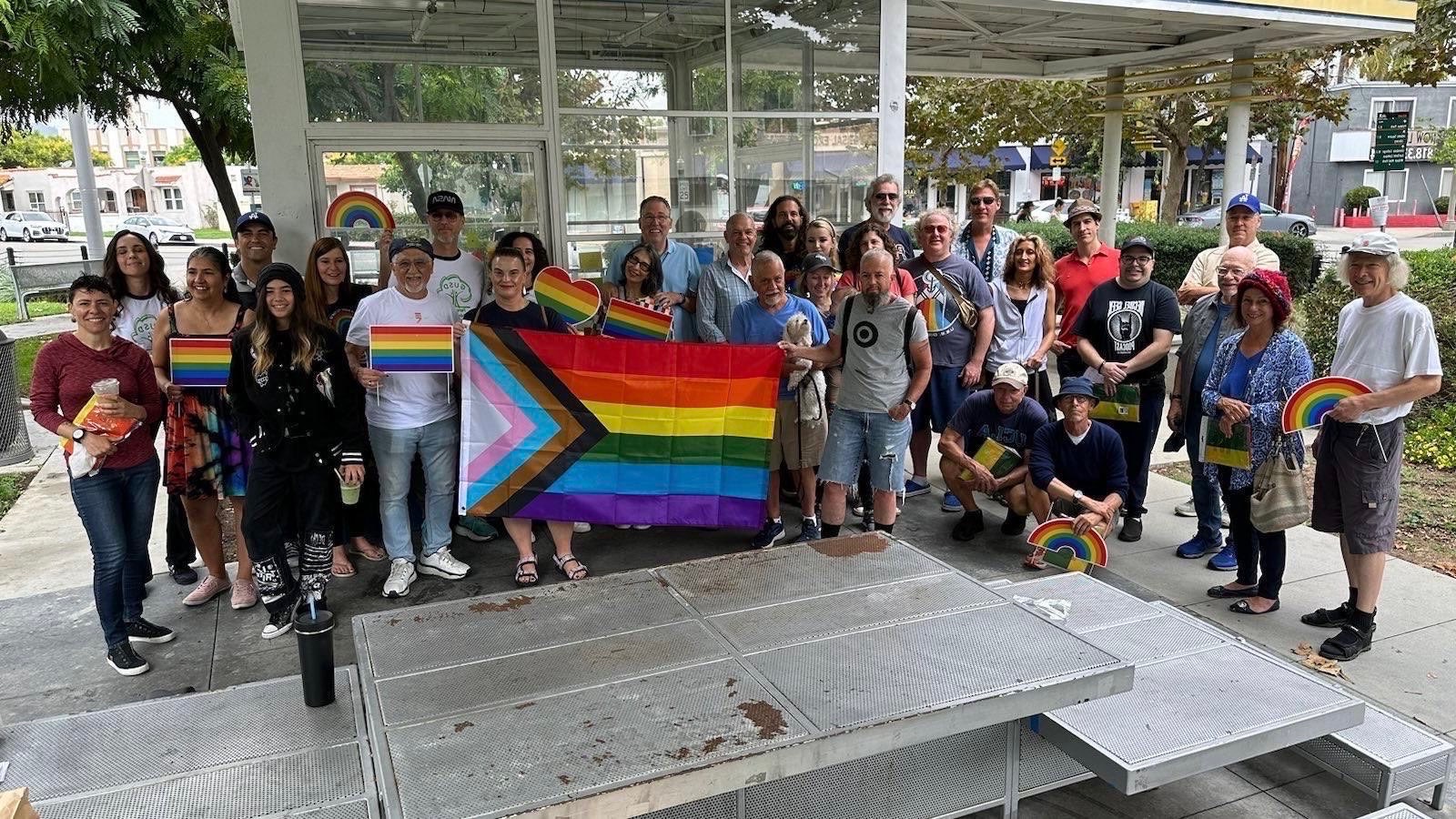
Over the last three weeks, glendaleOUT — a local LGBTQ group based in Glendale, California and city leadership have been at odds over securing financial support of a family-friendly Pride event set to happen on Saturday, June 7. As of Tuesday, Glendale’s city council voted 3-2 in favor of funding the event, ending a weeks-long argument over securing the funds.
The controversy began when the group highlighted how neighboring cities have visibly demonstrated support for Pride Month celebrations across the county, while the City of Glendale has yet to sponsor events with banners, city logos and financial sponsorship.
Councilmember Dan Brotman proposed $5,000 in sponsorship funds, noting that the city has funded other cultural events with much larger amounts.
Local leaders, but specifically Mayor Ara Najarian — who was just re-elected for a fifth term — are pushing back and opposing the proposal for funding. According to sources, Mayor Najarian openly opposed the proposal, stating a distant conflict of interest as the reason for the opposition.
LGBTQ advocates have been quoted as saying this is a “bad-faith political tactic, not grounded in any real conflict of interest.”
The next potential vote is expected to happen today at a city council meeting. Organizers say that the Pride event will happen regardless, but that they still hope to shed light on the patterns of sexual orientation-based discrimination in the city council.
For more information about the free community Pride event, visit glendaleOUT’s website.
California
LA County officially kicks off Pride Month with blessing from The Sisters of Perpetual Indulgence
‘This needs to be done, because once again, our county and our nation houses people who want us gone, who wish us harm’
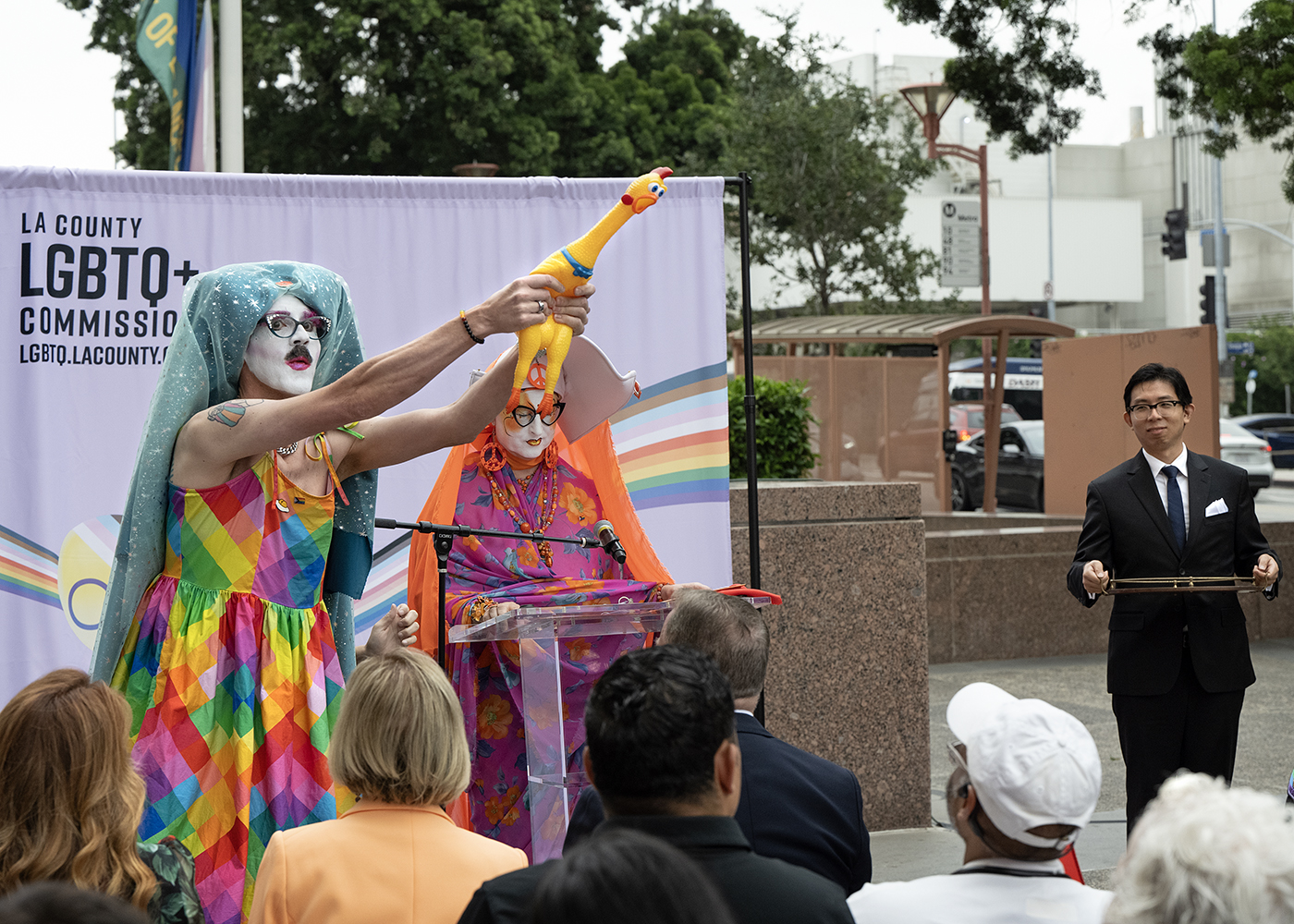
The LA County Board of Supervisors and the LA County LGBTQ+ Committee gathered on Tuesday, June 3, to officially kick off Pride Month across the county with a blessing from The Sisters of Perpetual Indulgence, who purified the space with their sacred chicken, then led everyone in blessing the Progress Pride flag before raising it at the Kenneth Hall of Administration.
“By raising this flag, the emblem of our souls and of our souls, of our love, of our survival, and of the gifts we offer to every Angeleno in this county — you all declare and you declare to everyone both here and abroad, that we are your people and you affirm that this is our home too,” said Sister Unity. “This needs to be done, because once again, our county and our nation houses people who want us gone, who wish us harm.”

LA County Supervisors and other community leaders gathered on Tuesday at the Kenneth Hall of Administration to raise the Progress Pride flag in honor of Pride Month. (Photo credit to Diandra Jay)
Supervisors Janice Hanh, Holly J. Mitchell, Lindsey P. Hovarth and Hilda L. Solis spoke on the importance of representation in the face of discrimination, homophobia and transphobia.
Supervisor Hahn mentioned in her speech that her father, Kenneth Frederick Hahn designed the LA County flag and it was clear to her that he believed that a flag was more than just a piece of fabric.
“My dad, the original Supervisor Hanh, designed the LA County flag and he understood that a flag is not just fabric. A flag is a symbol. It’s a visual representation of who we are, what we value and what we stand for.”
Two years ago, Supervisor Hahn started the tradition to raise the flag alongside the one her father designed and then it was Supervisor Horvath who suggested that the Pride flag be flown on all county facilities across Los Angeles.
“Now, in every corner of our vast county — from our lifeguard stations on our beaches, to every library, fire station — and may I add: all eight county buildings in the city of Downey. Wherever there is a county facility, the Progress Pride flag will send a clear, powerful message to our LGBTQ residents: ‘your county government unequivocally and unapologetically has your back.’”
The comment about the city of Downey is in regards to a controversial Pride flag ban that was enacted last year.
Supervisor Hahn then introduced LA County Assessor Jeff Prang, one of the longest-serving, out, elected officials in the state of California. Due to his long history in government and as a member of the LGBTQ community, Assessor Prang helped launch the LA County LGBTQ Elected Officials Association with over 50 active members from all levels of government.
“We are in a moment of crisis in the nation. Across the country, an extremist movement is working to dismantle LGBTQ rights — from banning books to criminalizing gender-affirming care, to silencing drag performers, to targeting our youth and families with cruelty disguised as policy,” said Assessor Prang. “These are not isolated incidents, this is a campaign of fear and repression.”
Héctor Trinidad-Plascencia, the Chair of LGBTQ+ Commission, encouraged attendees who are not from the queer and trans communities, to remove the blockages that keep them from being in solidarity with queer and trans people.
“With your solidarity, we are creating a different world together starting in our county home and for the nation to follow,” they said.
a&e features
Cumbiatón returns to Los Angeles right in time for Pride season
‘Que viva la joteria,’ translates roughly to “Let the gayness live”

Healing and uplifting communities through music and unity is the foundation of this event space created by Zacil “DJ Sizzle Fantastic” Pech and Norma “Normz La Oaxaqueña” Fajardo.
For nearly a decade DJ Sizzle has built a reputation in the queer POC and Spanish-speaking undocumented communities for making the space for them to come together to celebrate their culture and partake in the ultimate act of resistance — joy.

Couples, companions, comadres all dance together on the dancefloor at Cumbiatón. (Photo courtesy of Cumbiatón).
Cumbiatón was created during the first Trump administration as a direct response to the erasure, racism, homophobia and xenophobia that was engrained into the administration’s mission for those first four years. Now that the second Trump administration is upon us, the racism, homophobia, transphobia and xenophobia are tenfold.
This event space is a ‘party for the hood, by the hood.’ It is led by women, queer and trans people of color in every aspect of the production process.
The recent fires that burned through Altadena and Pacific Palisades made DJ Sizzle decide to step back from marketing the event in Los Angeles, an area where people had just lost their businesses, homes and where their lives were completely thrown for a loop.
Now they’re back, doubling-down on their mission to bring cumbias, corridos and all the music many of us grew up listening to, to places that are accessible and safe for our communities.
“I started Cumbiatón back in 2016, right after the election — which was weirdly similar because we’re going through it again. And a lot of us come from the Deferred Action for Childhood Arrivals (DACA) movement. We were the ones to really push for that to happen along with the DREAM Act.”
DJ Sizzle says that she wanted to create a space out on the streets to celebrate life and come together, because of how mentally and physically taxing it is to be a part of the marginalized communities that were and still are, a major target for ongoing political attacks.

Edwin Soto and Julio Salgado pose for a photo at a Cumbiaton event in 2024. (Photo courtesy of Cumbiatón).
“We need these spaces so that we can kind of refuel and rejoice in each other’s existence,” said DJ Sizzle. “Because we saw each other out on the street a lot, but never did we really have time to sit down, have a drink, talk, laugh. So I found that music was the way to bring people together and that’s how Cumbiatón got started. It was honestly like a movement of political resistance through music.”
DJ Sizzle is an undocumented community organizer who aims to not only bring awareness to the issues that her communities face, but also to make space to celebrate the wins and bond over the music that brings people in Latin America, East L.A., Boyle Heights and the Bay area together.
Julio Salgado, a queer, visionary artist and migrant rights activist from Ensenada, Baja California with roots in Long Beach and the Bay Area, connected with DJ Sizzle over their shared passion in advocating for immigrant rights.
“Cumbiatón was created during the first [Trump] administration, where you know, a lot of people were really bummed out and so what Sizzle wanted to create was a place where people could come together and celebrate ourselves,” said Salgado. “Fast-forward to the second [Trump] administration and we’re here and feel a little bit more like: ‘oh shit, things are bad again.’ But, things have always been bad.”
Salgado is involved with Cumbiatón through his art. He is a mixed-media artist who creates cartoons using his lived experience with his sobriety journey, undocumented status and queer identity.
With a background in journalism from California State University, Long Beach, Salgado documents what activists do in the undocumented spaces he has been a part of throughout his life.
In 2017, Salgado moved back to Long Beach from the Bay Area, and at the time he started doing political artwork and posters for protests against the first Trump administration, but because the nature of that work can be very tiring, he says that he turned to a more uplifting version of his art where he also draws the joy and unity in his communities.
When he and Sizzle linked up to collaborate during that time, he thought he could use his skills to help uplift this brand and bring it to the forefront of the many events that saturate the party landscape.

DJ Sizzle doing her thing on stage, giving the crowd the music they went looking for. (Photo courtesy of Cumbiatón).
“We are familiar with using the dance floor as a way to kind of put the trauma a little bit away just for one night, get together and completely forget,” said Salgado.
Coming from an undocumented background, Salgado and Sizzle say that their experience with their legal status has made them very aware of how to go about the ID-check process at the door for their events.
“When you’re undocumented, you have something called a [High Security Consular Registration (HSCR)] and it’s kind of like your ID and many of these heterosexual clubs would see that and say it was fake,” said Salgado. “But at the gay club, they didn’t care.”
Just being conscious of what that form of ID looks like and knowing that it’s not fake, helps many of the hundreds of people who come through for Cumbiatón, feel just slightly more at ease.
Edwin Soto, who is another community activist and leader in the undocu-queer community, is also involved in the planning and organizing of the event.
In the long journey of making Cumbiatón what it is now, they say that they have all been very intentional about who they bring in, making sure that whoever they are, they also understand the experience of being undocumented and accepted anyway.
“Something that Sizzle and the team have been very intentional about is making sure that [the security at the door] knows that someone might be using their consulate card,” said Soto.
Bringing together this event space is no easy task, considering the fact that their events are deeply thought out, intentional and inclusive of not just people of color, but also people with differing abilities and people who do not reflect the norm in West Hollywood clubs.
“We created the space that we were longing for that we did not see in West Hollywood,” he said. “[Cumbiatón] is what life could really be like. Where women are not harassed by men. Where people are not body-shamed for what they’re wearing.”
When it comes to their lives outside of Cumbiatón and partying, Sizzle says that it does get exhausting and planning the event gets overwhelming.
“It is really difficult, I’m not going to lie,” said DJ Sizzle. “We are at a disadvantage being queer and being undocumented because this administration triggers us to a point that, anyone who is not a part of those identities or marginalized communities would ever be able to understand,” said Sizzle. “There are times where I’m just like: ‘I’m going to cocoon for a little bit’ and then that affects the marketing and the communication.”

Usually, the events bring in hundreds of people who are looking for community, safety and inclusion. (Photo courtesy of Cumbiatón).
That’s a little bit about what goes on behind the scenes — which really shouldn’t come as a surprise for anyone who is out there fighting for basic human rights, while also making the space to party and enjoy themselves.
“I’m really trying to find balance and honestly my life raft are my friends and my community,” she said. “Like, being able to share, being able to have this plática, and be like ‘bitch, I see you and I know its fucked up, but we got each other.’”
Cumbiatón was made with the purpose of making space to include and invite the many different people in these communities who are otherwise sidelined in broader conversations and in party scenes where they are not as inclusive or thoughtful about their attendees.
“How beautiful is it to be queer and listen to rancheras and to norteñas and cumbia, and to just own it,” said Soto.
To join Cumbiatón at their next party, visit their Instagram page.
a&e features
Frankie Grande is loud and proud this WeHo Pride
Frankie Grande will be hitting the stage at this year’s Outloud Music Festival at WeHo Pride and is ready to bring the party

Among other queer and ally big names like Lizzo, Alyssa Edwards, Kim Petras and Frankie Grande will be taking center stage on Saturday, May 31, at this year’s OUTLOUD Music Festival at WeHo Pride. In the wake of the queer community’s current political strife, Grande is taking the spotlight, unapologetically and ready to bring the party, celebrating activism and sexuality unabashedly.
Hot off the heels of his recent two hit singles, “Rhythm of Love” and “Boys,” Grande is gearing up for the release of his new album, Hotel Rock Bottom, hitting platforms on June 27. The album is bringing queer aesthetic to the pop genre and is a retelling of Grande’s life as he has gone from party boy to stage, screen, and reality TV personality, to getting married and living a sober family life (dog and all).
We sat for a chat with Grande as he prepares for his WeHo Pride extravaganza. With everything socially and politically considered, Grande is not holding anything back this Pride season.
Pride is recharging and gearing up for battle. I feel like we’re in a place where our community is under attack, and this is the time where we get the microphone so recharge and get ready to be loud and be prouder than we ever have before. We need to show the world that we are not to be fucked with. We got the mic, so let’s use it.
No stranger to taking the stage, Grande promises a spectacle for his Outloud appearance.
I’m so excited. I’ve put so much effort into crafting a very beautiful show, a very gay show, a very hot show. I’ve selected some really fun songs from my album that people are going to get to hear for the first time because the album won’t be out. I’m also doing some fun and clever covers of songs that have inspired me. I’m excited that I’ve mixed it up and it’s going to be really fun and really gay.
This Pride, Frankie’s call to the gay community is clear.
Support our trans siblings. It is more important than ever. Go to your trans friends and be like, “Hey, what do you need? And how can I help?” Because they’re the ones who are directly being scapegoated at this moment. To think that it’s happening to them means it’s not happening to you is crazy. We are all part of the same community. We’re all under the rainbow umbrella, so let’s go support the community that is directly under attack right now.
Grande’s album comes at a time when queer folk could use a little levity and party attitude. He has been a long-time spokesperson for the LGBTQ community. He has used his platform from reality TV to his role as GLAAD board member to incite activism. He knows full well the fatigue that many of the queer community face as we continue to resist a brutal Presidential administration.
You have to find moments of joy. Honestly, that’s a lot of what this album is to me. It’s like, let’s dance around and bop and be silly to boys tonight so that we can hit the ground running tomorrow and go get some legislation overturned. My whole life, I’ve turned to the dance floor during times of stress, and I think we do need to do that. We have to go celebrate. We have to remember why it is so fun to be a huge homosexual and what we’re fighting for. But then we need to go fight. Don’t get so fucked up that you have to be in bed for three days because we actually do need to go to work.
Grande has also become the poster boy for sober party gays. Celebrating 8 years of sobriety, he has been very open about his journey and how it fits into gay culture. Being openly sober has gained momentum in the queer community and many Prides now include dry events. Grande knows the triggers that Pride can include and has some advice to his fellow sober folk.
First of all, sober gays are fun gays, let’s just say that. If you’re triggered, get the fuck out. You know? There are a lot of drugs, there’s a lot of drinking, there’s a lot of partying, and sometimes you’re just not fully ready to be in those environments. And if that is true, then just leave. The people who are drinking and using will have no idea that you left.
Also go find some sober friends to go with. I did everything in sobriety, like linked with my sober BFFs, Salina EsTitties and stylist Mandoh Melendez. They were my bodyguards and they were my shield, and they had more sobriety than I did. They showed me the ropes, and to this day, they’re still sober and my best friends. So, get a sober buddy and GTFO when you’re triggered, just leave.
Grande is being very vulnerable in his upcoming album Hotel Rock Bottom. Not only is he leaving himself to be compared to other family members in the business, but he is also telling his story on his own terms with music. What is his intent with his album?
My mission with this album is to inspire others to be themselves by being so open and honest. If you just want to listen to the surface value of my album, then you’re going to have a great fun dance time being like, this is so much fun. But if you want to actually go and listen to the lyrics and dissect it, you’ll see that there’s a lot of darkness and a lot of light on both sides of this album. I organized this album into side A and side B, or top and bottom, as we’re calling it on the vinyl. There’s sobriety and using days, there’s good and bad, and highs and lows on both. So, no judgment, it’s all about just be yourself, live your life, live authentically, and you’re going to get through whatever you’re dealing with.
And his message to the queer LA community this Weho Pride?
We’re very privileged and we’re very blessed because we’re in a very liberal and very blue state, so we need to have the best time and show up. But let’s make sure that we’re constantly beaming our love, light, and energy, and thinking about how we can help people in red states who are not going to have a governmentally and a community-supported Pride, because that is a reality these days. Let’s try to figure out how we’re going to help the country while we’re in the most liberal, most protected state in the world, which is fabulous.
Catch Grande onstage at Outloud on Saturday, May 31st. Hotel Rock Bottom will be released June 27th, available wherever you stream your music.
California
New sapphic social club comes to West Hollywood
BBGRL Club debut night brings in full house with Niña Dioz performing live alongside local pop star BBGRL

BBGRL, formerly known as Dom, is an upcoming ethereal pop artist and visionary behind BBGRL Club — the femme-forward collective that aims to celebrate sapphic joy through music, performances and futuristic self-expression. Her pop sound blends synths, intimate vocals and Y2K nostalgia to build a unique experience for her audience.
BBGRL Social Club was born out of the idea that there needs to be more events for lesbians and sapphics in the City of Los Angeles. A city well-known for its vibrant and populous queer and trans community, struggles to make space for the many sapphics that inhibit the metropolis.
West Hollywood is home to a plethora of queer bars that are really open to all, but are locally known to cater more specifically to the gay male community. Whether it’s because of their male go-go dancers, beefy boy bartenders, or open restroom design for urinals and very few stalls, WeHo is very much for the gays.
Now, we’re in 2025 and Dominique ‘Dom’ Buggs, libra, set out to be one of the few sapphics in Los Angeles to make space for the first letter of the acronym. Though there are a few other event spaces that do host consistent sapphic-centered nights, BBGRL, formerly known as Dom, wanted to make sure there was a space that not only welcomed, but centered the BIPOC baddies. Dom is from Mexico City, but is also half Black, so creating spaces like this is her personal mission.
“[The goal] was to make a space where they could belong because I have been living in West Hollywood for many years and I really know there is a huge need for more authentic places that are actually inclusive to people from all walks of life, but that specifically center [sapphic] people,” said Dom in an exclusive interview with the Los Angeles Blade.

Emerging ethereal pop artist BBGRL interacts with the crowd during her debut night at WeHo’s Roosterfish on May 3, 2025.
(Photo credit to David Tran and Jocelyn Perich)
Even now in 2025 there are very few spaces that consistently cater to the sapphic community. At the start of 2025, there were only two. Only a few months into the new year and The Ruby Fruit — a sapphically-inclined wine bar in Silverlake — closed its doors due to what the owners say were financial circumstances beyond their control. The only other sapphically-centered space is Honey’s at Star Love. The bars opened around the same time, but Honey’s is an eccentric and charming place owned by queer, Black, women.
Though there are very few other spaces that are intentional about making space for lesbian or sapphic nights, there are a lot of event organizers who take up the space on one night of the week or month.
At Little Joy Cocktails in Echo Park, “Butchona” has one day a month to bring in all the lesbianas and butchonas who dress like their tíos — but better. At Bar Flores, there is a “The World is our Oyster” night, whose crowd tends to lean on the sapphic side.
Last December, Roosterfish opened in West Hollywood, now adding itself to the list of brick-and-mortars making has made the space for sapphic events like BBGRL.
“This is my first time performing original music in West Hollywood period — but in a long time too,” said BBGRL. “I’m very excited to share a little bit of what I’ve been working on for some years.”
BBGRL says that spaces like this are very necessary right now because of the social and political attacks on the LGBTQ community.
“I’m really trying to build something that is memorable and something that really brings people together during these times where we really, really need unity.”
During the social event’s debut night at Roosterfish in West Hollywood, BBGRL performed some of her music and invited long-time friend Niña Dioz to perform as well.
“We are comadres and we both realized that we both had so many dreams about moving to L.A. and two years later in 2015 we both made the move and ended up being neighbors in Hollywood,” said BBGRL. “We formed a very special friendship that is really rooted in what reminds us of home — which is our community. Eventually she became my family.”

Niña Dioz performs in West Hollywood on May 3, 2025. (Photo credit to David Tran and Jocelyn Perich)
After Niña Dioz returned to living in Mexico, BBGRL says it hit her hard, so their return to Hollywood to perform alongside BBGRL meant that much more to this dynamic duo.
Carla Reyna, better known as Niña Dioz, is a nonbinary, queer hip-hop artist from Monterrey, Mexico. Over a decade ago, they stepped into a rap scene overly-saturated by male rappers within a culture that is also notorious for ignoring and sidelining women, trans and gender nonconforming people. Niña Dioz says they continue to fight the mainstream and make space for themselves and their homegirls.
“I’m super excited to be here performing with my homegirl, BBGRL,” said Niña Dioz in an exclusive interview with the Los Angeles Blade.
Niña Dioz says they are also excited to be working on new music to be released at the end of May.
“I’m just excited to release new music,” said Dioz. “I took a few months off but it’s a song with Lenchanter. She sings chanteos (which is a slang term used in reggaeton music for fast and rhythmic lyrical music) and she is big in the queer, ballroom scene in Mexico City.”
Niña Dioz says they are also excited to be releasing a new house music track right in time for Pride month.
“I’m doing a lot of collaborations with artists from Latin America so you’re definitely going to be hearing from me this year,” they emphasized.
The event will be hosted monthly in West Hollywood and will feature other performers, as well as guest DJs from the sapphic scene. At this event, the line-up included well-known sapphic DJ Amandita, who immaculately brings the vibes at every event where they play their bops but to keep up with the next lineup, follow BBGRL on Instagram.
BBGRL’s next show will be on June 11 at The Peppermint Club in Los Angeles.

Arts & Entertainment
WeHo Pride and OUTLOUD Music Festival to host free concert
Registration for free tickets will open tomorrow, May 16 at 10a.m. PT

On Friday, May 30, WeHo Pride and OUTLOUD will kick off the weekend full of festivities with a free WeHo Pride Presents Friday Night outdoor concert.
WeHo Pride and OUTLOUD Music Festival have come together this year featuring a lineup of LGBTQ performers and LGBTQ-focused programming for all ages.
The kick off event is free, but requires an RSVP to secure the complimentary tickets and registration for tickets officially opens on Friday, May 16 at 10a.m. The headlining performer will be Maren Morris, a GRAMMY award-winning, singer-songwriter who came out as bisexual during Pride month last summer and released her fourth album earlier this month.
The OUTLOUD Music Festival will continue on Saturday, May 31, and Sunday, June 1, with a two-day concert experience spotlighting a dynamic lineup of LGBTQ+ artists including Lizzo, Remi Wolf, Kim Petras and Paris Hilton — all set to perform on the mainstage. Lil Nas X was also set to perform, but has been taken out of the lineup due to health issues.
The SummerTramp stage will have Honey Dijon as the headliner, and feature sets from Horse Meat Disco, salute, Meredith Marks, Brooke Eden, and others. The Saturday and Sunday concerts are not free and do require tickets to be purchased in advance.
“WeHo Pride Weekend is nearly upon us. Hosting WeHo Pride Presents Friday Night at OUTLOUD with free-entry tickets is more than symbolic — it’s a declaration that equality and inclusion matter,” said Chelsea Lee Byers, mayor of West Hollywood. “In West Hollywood, we celebrate queer lives and artists. At a time when LGBTQ communities face a surge of attacks across the country, West Hollywood remains committed to raising visibility and vibrantly celebrating our community. I’m so proud that the City of West Hollywood stands firm in the fight for LGBTQ rights and creative expression. I hope to see everyone out on Friday Night at OUTLOUD!”
WeHo Pride Presents Friday Night at OUTLOUD will begin at 6p.m. on Friday, May 30. The free WeHo Pride Street Fair will then take place on Saturday, May 31 and Sunday, June 1, beginning at noon. Both days will feature live entertainment, drag performances, activities and dyke-tivities such as the Dyke March and Women’s Freedom Festival on Saturday, taking place at the WeHo Pride Community Stage.
“This event is all about showing up, celebrating loudly, and creating space for queer joy and none of it would be possible without the incredible support from the City of West Hollywood,” said Jeff Consoletti, founder and executive producer of OUTLOUD. “We’re beyond grateful to have our partnership extended through 2030 and can’t wait to keep building something unforgettable together year after year.”
Weekend and single day passes are on sale now.
For more information, visit the OUTLOUD Festival website.
-

 Breaking News2 days ago
Breaking News2 days agoMajor victory for LGBTQ funding in LA County
-

 Features2 days ago
Features2 days agoKoaty & Sumner: Finding love in the adult industry
-

 Books4 days ago
Books4 days agoTwo new books on dining out LGBTQ-style
-

 Miscellaneous2 days ago
Miscellaneous2 days agoCan you really find true love in LA? Insights from a queer matchmaker
-

 Commentary7 hours ago
Commentary7 hours agoBreaking the mental health mold with Ketamine: insights from creator of Better U
-

 El Salvador3 days ago
El Salvador3 days agoLa marcha LGBTQ+ desafía el silencio en El Salvador
-

 Arts & Entertainment2 days ago
Arts & Entertainment2 days agoIntuitive Shana gives us her hot take for July’s tarot reading






